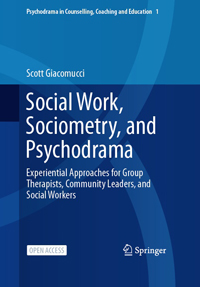 Reading Room Reading Room
Social Work, Sociometry, and Psychodrama:
Experiential Approaches for Group Therapists, Community Leaders, and Social Workers
By Scott Giacomucci, DSW, LCSW, BCD, FAAETS, PAT
This is the first and only book published on the intersection of the social work field and the triadic system of Jacob Moreno—Sociometry, Psychodrama, and Group Psychotherapy. The 468-page book was published open access which allows for anyone to freely read and download the entire book. This is done in the spirit of social work and in the spirit of Jacob Moreno who believed that ideas had to be freely given back to the world. This peer-reviewed scholarly publication is also the first of a new academic psychodrama book series published by Springer Nature targeting an international audience. Though Moreno’s work is only somewhat known in the USA, other countries have embraced sociometry/psychodrama and even developed Masters or Doctoral programs devoted to Moreno’s triadic system. The book significantly helps integrate sociometry and psychodrama into American academia which has lagged behind other countries in this regard.
The book emerged from the author’s own journey of integrating the professional roles of social worker and psychodramatist. These theoretical systems and the practice of both have much in common. Social workers are often articulating the same idea as Moreno but different language—person-in-environment, mutual aid, social justice, dignity/worth, etc. In many ways, Moreno operated as a social worker, working with marginalized/oppressed populations, emphasizing relationships and social forces, and advocating for an integrated approach to change at the individual, group, and societal levels.
The content of this book addresses a variety of biopsychosocial-spiritual issues and serves to enhance practice in macro social work, social group work (mezzo), and clinical work (micro). Sections include history, philosophy, theory, practice with individuals, groups, communities, and organizations, and supervision/teaching. Special chapters are dedicated to trauma, strength-based approach, neurobiology, and evidenced-based practice. The book presents sociometry and psychodrama as independent methods congruent with social work philosophy, as approaches that can be integrated into social work to enhance practice, and as experiential processes that can be employed across social work areas of practice (work with individuals, groups, communities, organizations, supervisees, and students). The book was written to appeal to social workers, scholars/researchers, practitioners, activists, leaders, educators, supervisors, and group workers. The chapters on practice include many examples of how to use experiential processes in a trauma-informed way within diverse populations in varied settings.
https://link.springer.com/book/10.1007/978-981-33-6342-7
|